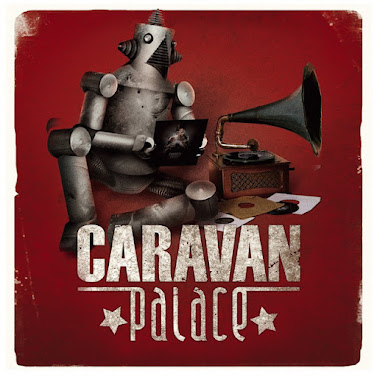Jazz, Electro, and a Smuggler’s Swagger
If Django Reinhardt and Daft Punk had a love child raised by a Parisian cabaret troupe, it would sound like Jolie Coquine. Caravan Palace, the electro-swing maestros, took everything dusty, old, and sophisticated about swing music, slapped a neon visor on it, and sent it breakdancing into the 21st century. And guess what? It works. Released on their 2008 self-titled debut album, Jolie Coquine became the mischievous gateway drug for an entire generation discovering that yes, swing can and should come with a drum machine.
Gypsy Jazz Gets a Makeover
Musically, Jolie Coquine is a Frankenstein’s monster of high-energy swing and electronic pulse. Picture a smoky underground jazz club, except the saxophone player is wired into an amp, and the drummer thinks he’s in a house music rave. The track opens with a cheeky, stuttering clarinet riff, immediately announcing that you’re about to dance whether you like it or not. The driving double bass slaps along with machine-like precision, giving the track a bouncing, locomotive groove. Then the synths creep in—subtle at first, then all-consuming, like a mad scientist taking over the bandstand.
And let’s talk about that voice—playful, slinky, and distinctly French. Zoé Colotis, Caravan Palace’s lead singer, doesn’t just sing; she teases, smirks, and winks at the listener with every syllable. Her delivery sits somewhere between a 1920s flapper and a modern electro-pop siren, perfectly complementing the mix of old-world charm and new-age chaos. The instrumental breakdowns? Pure dancefloor gold, ensuring that even the most rhythmically challenged among us can flail around convincingly.
Who’s Cooking Up This Madness?
Caravan Palace is a band that thrives on not taking itself too seriously, but musically, these folks are as tight as a drum.
• Zoé Colotis – Lead vocals, the sly voice of temptation.
• Charles Delaporte – Double bass, the backbone of the groove.
• Arnaud Vial – Guitar, bringing the gypsy jazz riffs straight out of the Django Reinhardt playbook.
• Hugues Payen – Violin, injecting a little “chase scene from a heist movie” energy.
• Antoine Toustou – Trombone, adding that smoky, vintage brass charm.
• Paul-Marie Barbier – Percussion and keys, stitching the whole madness together.
• Raphaël Clerc – Rhythm guitar, making sure the swing swings hard.
These people are having the time of their lives, and it’s impossible not to get swept up in their contagious, time-warping energy.
The Album and the Public Eye: From Niche to Global Cool
Released in 2008 on Caravan Palace’s debut album, Jolie Coquine arrived when the world wasn’t entirely sure what to do with electro-swing. Was it a gimmick? A passing trend? A hipster fever dream? Caravan Palace didn’t care. They threw their synths and swing beats into the world with reckless abandon, and people loved it. The track quickly became an anthem for anyone looking to party like it’s 1929—except with WiFi and strobe lights.
Caravan Palace rode the digital wave to popularity, racking up millions of streams and sneaking their way into commercials, dance playlists, and European music festivals where the only rule was “if you’re not moving, you’re dead.” Electro-swing purists (if such creatures exist) might debate whether Jolie Coquine is the genre’s defining song, but it’s certainly the one that got most of us through the door.
Flirting with the French
Ah, the lyrics. Half-French, half-English, and all mischief. The song doesn’t really say much—it suggests, it implies, it seduces. “Jolie Coquine” translates to something like “pretty rascal” or “cheeky cutie,” and the lyrics revel in playful ambiguity. Lines like “Mon cœur est prisonnier” (My heart is a prisoner) are delivered with a wink, as if love itself is just a game to be played with jazz hands.
Rather than a coherent narrative, the lyrics act as snippets of a smoky, late-night conversation in a jazz bar where everyone is a little too tipsy to be entirely honest. The mix of languages only adds to the mystery, making English-speaking listeners feel like they’re eavesdropping on something vaguely scandalous.
The Swing That Stuck
So what’s Jolie Coquine’s place in the grand scheme of music history? For one, it helped solidify electro-swing as more than just a gimmick. It became a dance-floor staple, a soundtrack for YouTube animation memes (yes, that one), and the reason why so many people suddenly thought they needed a fedora. The song’s enduring popularity has made Caravan Palace the poster children of the genre, ensuring that, for better or worse, there will always be someone attempting to Charleston in a nightclub somewhere.
More importantly, Jolie Coquine proved that genre fusion could be more than just novelty. It showed that swing and electronic beats could not only coexist but thrive together, giving birth to an entire movement of bands attempting their own jazz-meets-techno alchemy.
The Party That Never Ends
In the end, Jolie Coquine is a song that refuses to be ignored. It kicks down the door, winks at you from across the room, and dares you to keep up. It’s timeless, but not in the usual way—it’s a time machine constantly bouncing between the Roaring Twenties and the digital future, dragging anyone who listens along for the ride.
So whether you’re sipping a cocktail in a dimly lit speakeasy or raving under neon lights, Jolie Coquine is proof that some music is just fun—and sometimes, that’s all a song needs to be.
#CaravanPalace #JolieCoquine #ElectroSwing #SwingRevival #JazzMeetsEDM #VintageVibes #ElectroJazz #GypsyJazz #FrenchMusic #DanceFloorGold #MusicFusion #RetroFuturism #SwingDance #CharlestonBeats #NeonJazz #SpeakeasyGroove #1920sWithWiFi #JazzElectroMashup #TimeWarpTunes #MusicalAlchemy





No comments:
Post a Comment